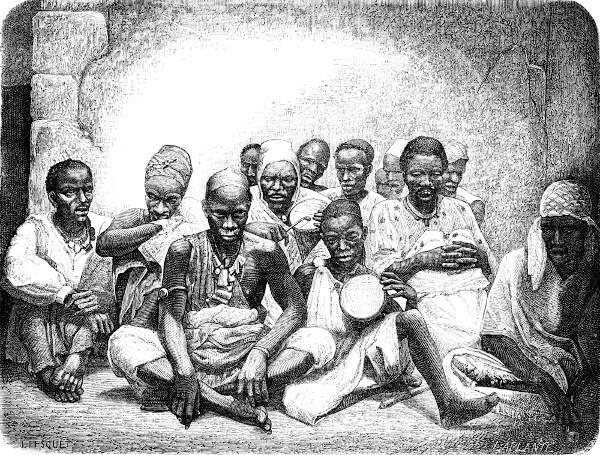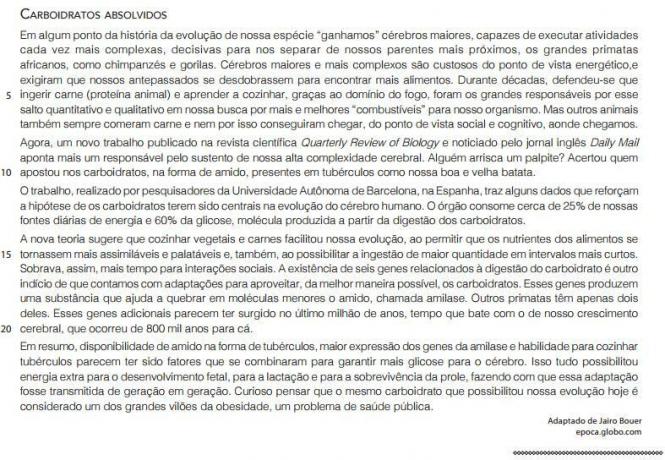African Literature is composed of works produced in African continent countries, but African literature in Portuguese has specific characteristics according to its period of production. Thus, the first African work in Portuguese — Spontaneities of my soul — was printed in 1849.
Works of African literature in Portuguese are inserted in three distinct periods: colonization, pre-independence and post-independence. And its best-known authors are: José Craveirinha (Mozambique), Noémia de Sousa (Mozambique), Pepetela (Angola), Mia Couto (Mozambique) and Paulina Chiziane (Mozambique).
Read too: Black literature — literary production whose subject of writing is the black person himself
Topics of this article
- 1 - Summary of African Literature
-
2 - Characteristics of African literature
- → Characteristics of African literature in the period of colonization
- → Characteristics of African literature in the pre-independence period
- → Characteristics of African literature in the post-independence period
- 3 - Main authors of African literature
- 4 - Main works of African literature
- 5 - African Literature in Brazil
- 6 - Importance of African literature
- 7 - Origins of African Literature
Abstract on African Literature
Works of African literature in Portuguese can be divided into three periods: colonization, pre-independence and post-independence.
The period of colonization is marked by cultural alienation.
The pre-independence period has works with an anti-colonialist discourse.
The post-independence period is characterized by the appreciation of African culture.
Spontaneities of my soul, by the Angolan author José da Silva Maia Ferreira, was the first African work in Portuguese to be printed, in 1849.
Features of African Literature
African literature is broad, as it concerns the various countries of Africa. Therefore, it would be more appropriate to say “African literatures”. Thus, we will present here characteristics shared by Portuguese-speaking African countries, which had a very similar history of colonization and struggle for independence. However, we must remember that the literature of each of these countries also has its peculiarities.
Do not stop now... There's more after the publicity ;)
→ Characteristics of African literature in the period of colonization
influences from European literature;
reproduction of classical culture;
traditional customs of Africa;
tension between colonial and African culture;
cultural alienation;
formal rigor in poetry.
→ Characteristics of African literature in the pre-independence period
social realism;
nationalism;
black identity;
folklorism;
anti-colonialist discourse;
modernist elements;
appreciation of popular culture.
→ Characteristics of African literature in the post-independence period
appreciation of African culture;
rescue of ancestry;
presence of native languages;
valorization of orality;
racial issues;
feminist elements;
nationalism;
diaspora theme;
experimentalism;
universalism.
Main authors of African literature
José da Silva Maia Ferreira (1827-1881) — Angola
Caetano da Costa Alegre (1864-1890) — Sao Tome and Principe
Antônio de Assis Júnior (1887-1960) — Angola
Jorge Barbosa (1902-1971) — Cape Verde
Baltasar Lopes (1907-1989) — Cape Verde
Manuel Lopes (1907-2005) — Cape Verde
Rui de Noronha (1909-1943) — Mozambique
Oscar Ribas (1909-2004) — Angola
Orlando Mendes (1916-1990) — Mozambique
Castro Soromenho (1919-1968) — Angola
Francisco José Tenreiro (1921-1963) — Sao Tome and Principe
Agostinho Neto (1922-1979) — Angola
José Craveirinha (1922-2003) — Mozambique
António Jacinto (1924-1991) — Angola
Orlanda Amarílis (1924-2014) — Cape Verde
Noémia de Sousa (1926-2002) — Mozambique
Alda do Espírito Santo (1926-2010) — Sao Tome and Principe
Viriato da Cruz (1928-1973) — Angola
Marcelino dos Santos (1929-2020) — Mozambique
Alda Lara (1930-1962) — Angola
Rui Knopfli (1932-1997) — Mozambique
Corsino Fortes (1933-2015) — Cape Verde
Mário António (1934-1989) — Angola
Onesimo Silveira (1935-2021) — Cape Verde
Lília Momplé (1935-) — Mozambique
Arlindo Barbeitos (1940-2021) — Angola
Ruy Duarte de Carvalho (1941-2010) — Angola
Pepetela (1941-) — Angola
Manuel Rui (1941-) — Angola
Luís Bernardo Honwana (1942-) — Mozambique
Filinto de Barros (1942-) — Guinea-Bissau
Boaventura Cardoso (1944-) — Angola
Jorge Viegas (1947-) — Mozambique
David Mestre (1948-1998) — Angola
Ana Paula Tavares (1952-) — Angola
Luís Carlos Patraquim (1953-) — Mozambique
Mia Couto (1955-) — Mozambique
Paulina Chiziane (1955-) — Mozambique
Ungulani Ba Ka Khosa (1957-) — Mozambique
Abdulai Sila (1958-) — Guinea-Bissau
Conceição Lima (1961-) — Sao Tome and Principe
Suleiman Cassamo (1962-) — Mozambique
Eduardo White (1963-2014) — Mozambique
Major works of African literature
Spontaneities of my soul (1849), by José da Silva Maia Ferreira
Verses (1916), by Caetano da Costa Alegre
Archipelago (1935), directed by Jorge Barbosa
the dead woman's secret (1935), by Antônio de Assis Júnior
holy name island (1942), by Francisco José Tenreiro
Sonnets (1946), by Rui de Noronha
Chiquinho (1947), directed by Baltasar Lopes
dead land (1949), by Castro Soromenho
uanga (1951), directed by Oscar Ribas
the country of others (1959), by Rui Knopfli
The Scourges of the East Wind (1960), by Manuel Lopes
chingufo (1961), by Mario António
poems (1961), by Agostinho Neto
poems (1961), by Antonio Jacinto
big time (1962), by Onesimo Silveira
We kill the mangy dog (1964), directed by Luís Bernardo Honwana
Toll (1966), directed by Orlando Mendes
The wave (1973), by Manuel Rui
poems (1974), directed by Viriato da Cruz
Karingana ua karingana (1974), directed by José Craveirinha
bread & phoneme (1975), directed by Corsino Fortes
From singing to age (1977), by David Mestre
Dizanga Dia Muenhu (1977), directed by Boaventura Cardoso
Ours is the sacred soil of the earth (1978), directed by Alda do Espírito Santo
Poetry (1979), directed by Alda Lara
Nzoji (1979), by Arlindo Barbeitos
mayombe (1979), by Pepetela
islet of birds (1983), directed by Orlanda Amarílis
natural love song (1987), directed by Marcelino dos Santos
ball of flame (1989), directed by Jorge Viegas
the return of the dead (1989), directed by Suleiman Cassamo
country of me (1990), directed by Edward White
Memory of so much war (1992), by Ruy Duarte de Carvalho
sleepwalking earth (1992), directed by Mia Couto
the last tragedy (1995) by Abdulai Sila
The eyes of the green snake (1997), by Lilia Momple
kikia matcho (1997), by Filinto de Barros
You tell me bitter things like fruits (2001), by Ana Paula Tavares
black blood (2001), by Noémia de Sousa
Niketche: a history of polygamy (2002), by Paulina Chiziane
The Survivors of the Night (2007) by Ungulani Ba Ka Khosa
pneuma (2009), by Luís Carlos Patraquim
African Literature in Brazil
It is from 2003 to law number 10,639, which determines:
In primary and secondary education establishments, official and private, teaching about Afro-Brazilian History and Culture becomes mandatory. […] Content related to Afro-Brazilian History and Culture will be taught within the scope of the entire the school curriculum, especially in the areas of Arts Education and Literature and History Brazilian.
From then on, there was, on the part of educational institutions, a greater interest in African literature in Portuguese, but Brazilian literature had been in dialogue with African literature for a long time. At the end of the 1930s, authors from Cape Verde manifested the influence of Brazilian modernist authors on the country's literature.
Later, this influence was also noted in Angola and Mozambique. However, the opposite movement is still not perceived, that is, the influence of African authors in Brazilian literature. Despite that, African culture is inevitably in our literature, as Brazil inherited many elements of that culture.
Only recently have we begun to speak of an Afro-Brazilian literature. This type of literature should have the reality of the black person as its theme. In addition, it must be produced by an Afro-descendant person that showcases Afro-Brazilian culture and language, and be aimed at an Afro-Brazilian audience. According to Eduardo de Assis Duarte, PhD in Theory of Literature and Comparative Literature:
It should be noted, however, that none of these isolated elements promote belonging to Afro-Brazilian Literature, but rather their interaction. In isolation, both the theme and the language, and even the authorship, the point of view, and even the reception direction are insufficient.|1|
Therefore, some works of afro-brazilian literature they are:
Ursula (1859), from Maria Firmina dos Reis (1822-1917)
eviction room (1960), from Caroline Mary of Jesus (1914-1977)
crumbled Dionysus (1984), by Domício Proença Filho (1936-)
God's city (1997), by Paulo Lins (1958-)
Poncia Vicencio (2003), from Conceição Evaristo (1946-)
Creole tales from Bahia (2004), by Mestre Didi (1917-2013)
from Kabula (2006), by Allan da Rosa (1976-)
See too: Brazilian literature — a literature that has more than 500 years of history
Importance of African Literature
Like the literature of any other country or continent, African literature also has the function of reflecting on the culture and history of its people, and rescue the history of their ancestors, in order to strengthen a tradition, which reflects the identity of a nation.
African Portuguese-speaking countries have a literature that transcends borders. This is because countries like Angola, Cape Verde, Guinea-Bissau, Mozambique and São Tomé and Príncipe share very similar stories, but also a language, Portuguese.
In that regard, dialogue expands with other continents, that is, Europe It is South America, since literature from Portugal and Brazil is also produced in Portuguese. In this way, these literatures influence each other and make up something larger, as they are part of the Portuguese language literature.
Origins of African Literature
African literature has a long oral tradition, therefore, in its early days, this was just how stories were told, without a written record. It was around the 18th century that the Portuguese colonizers began to think about an educational system in the African colonies, which was consolidated in the 19th century.

Like this, the first African work in Portuguese to be printed, in 1849, was Spontaneities of my soul, by José da Silva Maia Ferreira, Angolan author; but the handwritten narrative Brief treaty of the kingdoms (or rivers) of Guinea, by Cape Verdean André Álvares de Amada, dates from 1594.
Note
|1| DUARTE, Eduardo de Assis. Afro-Brazilian Literature: a concept under construction. Contemporary Brazilian Literature Studies, Brasília, n. 31, p. 11-23, Jan./Jun. 2008.
By Warley Souza
Literature Teacher
Click and find out what are the main characteristics of literary language. Know its importance to the art of writing.
Read the analysis of the Angolan novel “Mayombe”. Get to know its plot, characteristics and characters and, in addition, learn a little about the life of its author.
Meet Mozambican writer Mia Couto. Find out what are the characteristics of his main works and, in addition, see some phrases by this author.
Read the review of the novel Niketche — a story of polygamy. Get to know its plot, characteristics and characters, in addition to knowing a little about the life of its author.
Find out who the Mozambican writer Noémia de Sousa is. See what are the main characteristics of her poetry and get to know two poems by the author.
Find out who the Mozambican writer Paulina Chiziane is. See what are the main characteristics of her works. Also, get to know his most famous book.
Find out who Pepetela is, an important name in contemporary Angolan literature. See what awards he has won. Know the characteristics of her works.
Read the analysis of the Mozambican novel Terra sonâmbula. Get to know its plot, characteristics and characters, in addition to knowing a little about its author's life.



